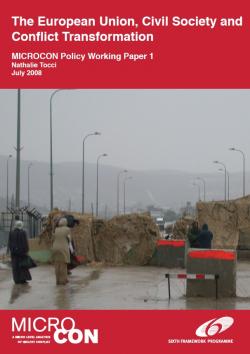The European Union, Civil Society and Conflict Transformation: A Conceptual Framework
The European Union considers conflict resolution as a cardinal objective of its foreign policy. It makes use of a number of policy instruments to promote conflict transformation through ‘constructive engagement’, which cover a range of sectors affecting conditions and incentives at the micro level. The EU has recognised the importance of engaging with civil society in situations of violent conflict, but needs to engage more with local civil society to make its policies more effective. This paper provides a conceptual framework and discussion to analyse which local civil society actors play a role in conflict and conflict transformation, through which activities they impact on conflicts and how, what determines their effectiveness, and finally how EU neighbourhood policies can enhance their constructive impact in peacefully transforming conflicts in its near abroad by engaging with civil society.
Paper produced in the context of the MICROCON project (Work Package 11, "Conflict in the European Neighbourhood"), funded by the EU's Seventh Framework Research Programme. Subsequent versions: "The European Union, Civil Society and Conflict: An Analytical Framework", in Nathalie Tocci (ed.), The European Union, Civil Society and Conflict, London and New York, Routledge, 2011, p. 1-27 (Routledge/UACES contemporary European studies ; 19); "EU, Conflict Transformation, and Civil Society: Promoting Peace from the Bottom Up?", in Patricia Justino, Tilman Brück, and Philip Verwimp (eds.), A Micro-Level Perspective on the Dynamics of Conflict, Violence, and Development, Oxford, Oxford University Press, December 2013, p. 269-289
-
Details
Brighton, Institute of Development Studies at the University of Sussex, July 2008, 40 p. (MICROCON Policy Working Paper ; 1) -
ISBN/ISSN/DOI:
978-1-85864-541-7
1. Introduction
2. Civil Society in Conflict and Conflict Transformation
2.1 A typology of actors
2.2 Local civil society potential for conflict escalation and transformation
3. Civil Society Activities
3.1 Direct and indirect civil society actions in conflict
3.2 Methods of actions across stages of conflict
4. The impact and effectiveness of local civil society in conflict
4.1 Impact
4.2 Effectiveness
5. The Role of the EU in the Neighbourhood
5.1 Hypothesis 1: The Liberal Peace Paradigm
5.2 Hypothesis 2: The Leftist Critique
5.3 Hypothesis 3: The Gramscian Critique
6. Guidelines for Empirical Research
References
Topic
Tag
Related content
-
Publication12/02/2015
The European Union, Civil Society and Conflict
leggi tutto -
Publication17/01/2015
EU, Conflict Transformation, and Civil Society
leggi tutto -
Publication08/02/2014
EU, Conflict Transformation, and Civil Society
leggi tutto



